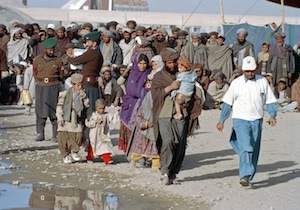 Photo shows an Afghan family in a UN refugee camp. UN Photo/Luke Powell
Photo shows an Afghan family in a UN refugee camp. UN Photo/Luke Powell
On June 4th & 5th the 60th session of the Committee on the Rights of the Child was held at the Palais Wilson in Geneva where Australia gave its 4th Periodic Report and was questioned by members of the Committee on their compliance with the Convention on the Rights of the Child since 2005 when Australia last reported. The committee also received submissions from independent civil society groups such as the Secretariat National Aboriginal Islander child Care (SNAICC), National Children’s & Youth Law Centre (NCYLC), Save the Children and Edmund Rice International(ERI).
A member of the Committee on the Rights of the Child, one of the independent experts who reviewed Australia’s performance, asked the Australian delegation about structures that the Australian Government has in place to support families living in poverty especially indigenous children? This member also asked how the best interests of the child were borne in mind when they are returned to their country of origin from Australian detention Centres?
Phil Glendenning and staff gathered by ERC (Sydney) when visiting Afghanistan recently gathered evidence from the deportees. Phil said in a recent media interview: ‘In this visit to Kabul, further to our previous visits, we met and interviewed another 31 returned asylum seekers. Sadly, 29 of these 31 are living in extreme danger. We confirmed the deaths of another two returnees and the kidnapping of one other who is now presumed dead. The majority of these men are unable to live with their wives and children because of the risk their simple presence would pose to the safety of their family. We were able to find a 17-year-old boy who was sent back from Australia last year and has ended up living on the street. One man I interviewed had recently survived a rocket being fired through his house. His wife and his father were killed instantly. He lives now in hiding in Kabul – along with his six children – all under the age of nine.’
To right the wrong that has been done requires advocacy with those who hold economic, social and political power at the local, national and international levels. We must use the UN conventions and treaties that are in place to claim these rights otherwise we fail those who have been silenced by an oppressive system. To develop strategies to re-claim human and ecological rights is one of the roles of ERI. Why have inherent God given rights if we don’t enact them?
The final report from the Committee on Australia’s child rights record will be available on the CRIN website on June 14, 2012.
Peter Harney